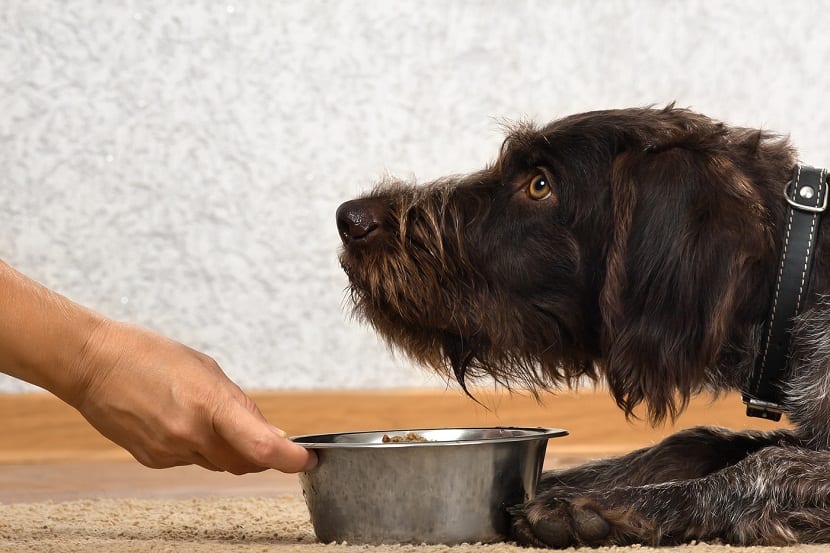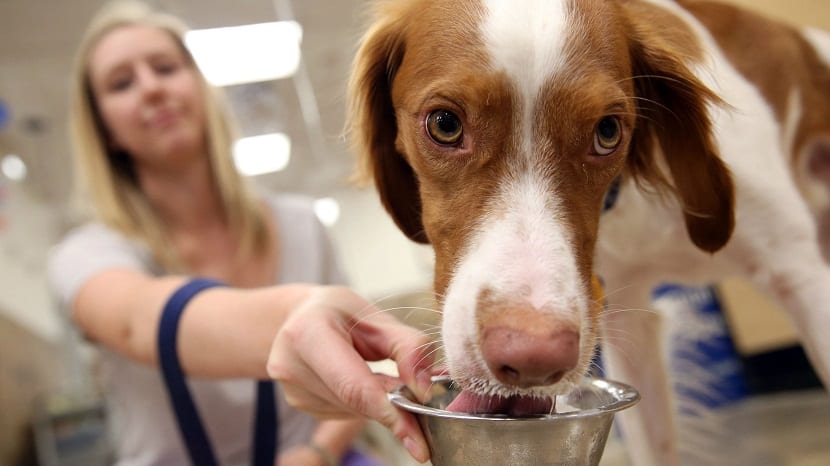
Diseases that affect both the stomach and intestines in dogs are more common than we think. This includes infectious diseases such as bacterial, viral and parasitic and non-infectious are tumors, swelling and obstruction.
Between the most common digestive disorders that dogs suffer we can mention the following.

Canine parvovirus
Canine parvovirus is a viral disease caused by a virus called parvovirus, which can be fatal if not treated in time. It most often affects puppies and adult dogs that are not vaccinated.
The virus itself is resistant to several common medications and can survive for several months and even a few years.
The virus transmitted by direct or indirect contact with infected dogs or feces. After entering the body either through the mouth or the nose, the virus multiplies and spreads into the bloodstream. Attacks cells, which quickly divide throughout the bodyespecially those of the bone marrow, the tissue that makes blood cells, and the lining of the small intestine.
This serious disease can be caused by stress and improper nutrition and the signs may be made worse by other infections of the digestive system.
Prolonged contact with a dog shedding high levels of virus increases the likelihood of infection. An infected dog can be contagious before the start of the signs.
There is no specific treatment to eliminate the virus, as most dogs recover with proper care and support, which focuses on replace lost fluids and electrolytes.
Oral electrolyte solutions can be used in mildly dehydrated dogs without a history of vomiting. More serious dogs will need IV fluids.
Most dogs that survive the first three to four days of illness generally recover within a week.
Colitis
Dogs suffering from colitis or inflammation of the colon, they tend to work harder than normal to defecate and their stools may be laden with mucus, sometimes with blood. Affected dogs may also have pain when defecating and the signs may come and go, however they tend to worsen over time.
In most cases, the cause of this disease is unknown, the origin is suspected to be bacterial, parasitic, traumatic, kidney-related and allergic.

Colitis can be the result of a defect in the function of the immune system in the colon. A overreaction to dietary or bacterial factors within the intestine, genetic predisposition or results of previous infectious or parasitic diseases.
Treatment for colitis will depend on the type of colitis the dog has, in general, the vet usually recommends a diet rich in fiber and protein, in addition to some anti-inflammatory medications.
Constipation
Constipation occurs when the dog has difficulty defecating, as it usually stools are dry and hard.
It is a fairly common problem in dogs, as in most cases, the problem is easily corrected, however, in sicker animals, the condition can be serious. The more stool that remains in the colon, the drier and harder it will get, causing the animal to suffer when defecating.
Lack of water or resistance to defecation on a regular basis due to environmental stress or pain that occurs during defecation contributes to formation of hard, dry stools.
Constipation can also be the result of neuromuscular problems, which can be caused by hypothyroidism, dysautonomia, spinal cord disease, pelvic nerve dysfunction, or electrolyte abnormalities. Some drugs can cause constipation as a side effect.
Dogs affected with this disease they should drink a lot of water. Mild constipation can often be treated by switching to a high fiber diet, preventing the dog from eating bones or other objects, providing quick access to water and use of appropriate laxatives. Laxatives formulated for humans can be very dangerous to animals, especially cats.
In the most severe cases of constipation, a veterinarian can remove the retained feces using the use of enemas or manual extraction while the dog is under general anesthesia.
To completely remove all stool, it may take two to three attempts over several days. To prevent constipation from recurring, veterinarians often recommend a high fiber diet, easy access to water and frequent opportunities to defecate.
Gastritis
Gastritis in dogs causes sudden and sometimes prolonged vomiting due to the stomach inflammation.
This disease can be caused due to ingestion of something that irritates or damages the stomach lining, infections, parasites, diseases throughout the body, drugs or poisons. In acute gastritis, vomiting is sudden, and the vomited material may contain evidence of what the pet ate, such as herbs.
Treatment and control for this disorder are the same as for vomiting, since the prognosis depends on the cause of vomiting and the ability to stop or control it.
Short-term gastritis often responds well to fasting and avoid consuming more than what triggered the disease. The long-term outlook for gastritis is variable. Research is ongoing in this area and trials of various diets and medications may provide new treatments for years to come.
Gastrointestinal ulcers
Stomach ulcers are the result of a collapse of the normal stomach lining and they are aggravated by an increase in hydrochloric acid or pepsin, which is a digestive enzyme.
Conditions that lead to increased acid production and that damage the stomach lining accelerate ulcer formation.
Gastrointestinal ulcers can be caused by a number of factors, including medications, tumors, infections, and general illnesses. Acids and digestive enzymes that are found inside the stomach break down food. The stomach lining must protect the rest of the stomach from these potentially harmful processes.
The goal of ulcer treatment is to determine the cause of the ulceration and then remove or control it.
Medication targeting the ulcer reduces gastric acidity, prevents destruction of the stomach lining and promotes ulcer healing. In general, treatment continues for six to eight weeks.
Dietary use includes use of soft diets and among the prescribed foods is chicken and rice. Antibiotics may be indicated for some dogs.
Inflammatory bowel disease

Inflammatory bowel disease is actually a group of diseases of the digestive system that are recognized by certain persistent signs and by the presence of inflammation without a known cause. The various forms of the disease are classified by their location and the type of cell that is involved.
The cause of inflammatory bowel disease is unknown, although food allergies are an unlikely cause in most cases, they can contribute to disease development in certain ways such as causing inflammation through excessive allergic reactions to certain foods, bacteria or parasites within the intestine.
Inflammation damages the mucosal barrier that protects the intestinal lining, making it even more sensitive to antigens.
Glucocorticoids, medications that are anti-inflammatory and suppress the immune system, are among the most widely used drugs in the treatment of inflammatory bowel disease.
Antiparasitic medications, certain antibiotics, vitamin supplements, or other anti-inflammatory medications may also be recommended.
Other diseases that occur more frequently in dogs they are:
- Swelling.
- Bowel obstruction.
- Cancer in the digestive system.
- Hemorrhagic Gastroenteritis.
- Malabsorption.